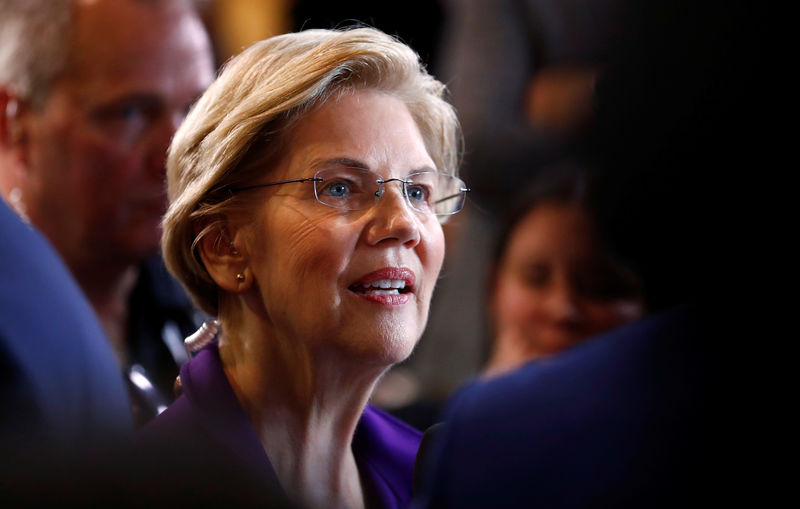By Amanda Becker
WASHINGTON (Reuters) - White House hopeful Elizabeth Warren is taking heat from her Democratic rivals for her demurrals when asked whether her Medicare for All healthcare plan would require raising taxes on middle-class households.
One explanation, according to sources close to Warren's campaign, is that the U.S. senator from Massachusetts is still considering financing options and at least one under review does not include a middle-class tax hike.
"I've been working for a long time on this question about what the costs will be and how to pay for it and I'm getting close. It's just got a little more work that it needs on it before it's ready," Warren told reporters in Indianola, Iowa, on Sunday, adding that she will be "ready to put out a plan soon on exactly what the costs will be."
How best to expand health insurance coverage has become one of the defining issues in the Democratic nominating contest to take on Republican President Donald Trump in November 2020.
Progressives Warren and U.S. Senator Bernie Sanders favor expanding the government's existing Medicare program for individuals 65 years and older to cover all Americans.
Moderates such as South Bend, Indiana Mayor Pete Buttigieg and former Vice President Joe Biden favor a more incremental opt-in approach that would have a lower price tag but cover fewer individuals.
How to pay for a single-payer system that could cost as much as $34 trillion over 10 years, according to a study released last week by the liberal Urban Institute, has become the main point of contention between the progressive and moderate Democratic White House candidates.
Warren has repeatedly said that she "will not sign a bill into law that does not lower costs for middle-class families." Her go-to answer when asked about paying for Medicare for All is that overall costs for families will go down.
Though Warren has become known for a voluminous stable of detailed policy proposals and "I have a plan for that" has become the catch phrase of her White House campaign, her initial healthcare plan was comparatively light on details. She has said "I'm with Bernie on Medicare for All" when asked about her stance.
Sanders introduced a Medicare for All bill in the Senate that would transition the U.S. to a single-payer system. But the legislation, which was co-sponsored by Warren and fellow 2020 rivals Senators Cory Booker and Kamala Harris, did not detail how to pay for the proposal. Sanders released a five-page explainer of financing options in conjunction with the bill's introduction.
'VERY DILIGENT'
In last week's presidential debate, Sanders said it would be "appropriate to acknowledge that taxes will go up" if the proposal is enacted, which could require approval from both chambers of the U.S. Congress.
Buttigieg on the campaign trail has slammed Warren for not detailing how she would pay for Medicare for all.
Sanders is one reason why Warren has yet to address whether middle-class tax rates would go up. "She's trying to be respectful of his genuine thought leadership here," said one progressive activist close to the campaign.
Another is that her campaign has solicited input from experts on a variety of Medicare for All financing options, including at least one that would not necessitate a middle-class tax hike.
Robert Pollin, an economics professor at the University of Massachusetts-Amherst who studied financing options for Sanders' 2017 Medicare for All bill and has advised both his and Warren's campaigns, estimated that a single-payer healthcare system would have cost the government $37.8 trillion over 2017-2026. New sources of revenue would be needed to cover about $13.5 trillion of that, he estimated.
Pollin said in an interview that his research shows a 1.8% business tax on gross receipts, a 3.75% federal sales tax on non-essential goods and a 0.38% tax on wealth above $1 million would respectively generate about $600 billion, $200 billion and $200 billion annually. That, along with cost savings associated with a single-payer system, would account for the $13.5 trillion needed.
He said he designed his plan to minimize impact on consumer behavior, keep the burden on employers to cover some healthcare costs via the business tax and that lower-income households would be exempt from the sales-tax on non-essential goods.
A middle-class household with an annual income of $60,000 would pay about $900 a year in sales tax. Depending on current healthcare costs, however, it would save about $2,000 to $8,000 each year, he said.
Pollin said his discussions with Warren's campaign are ongoing and its questions have been "very diligent."

"The notion that Elizabeth Warren's staff or Elizabeth Warren herself has neglected this is very false. They're trying to be very, very careful," he said.